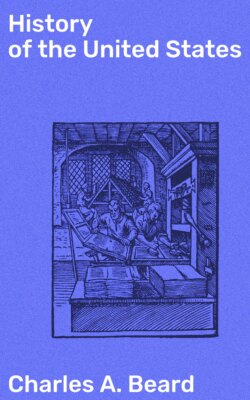Читать книгу History of the United States - Charles A. Beard - Страница 37
На сайте Литреса книга снята с продажи.
Summary of the Colonial Period
ОглавлениеTable of Contents
In the period between the landing of the English at Jamestown, Virginia, in 1607, and the close of the French and Indian war in 1763—a period of a century and a half—a new nation was being prepared on this continent to take its place among the powers of the earth. It was an epoch of migration. Western Europe contributed emigrants of many races and nationalities. The English led the way. Next to them in numerical importance were the Scotch-Irish and the Germans. Into the melting pot were also cast Dutch, Swedes, French, Jews, Welsh, and Irish. Thousands of negroes were brought from Africa to till Southern fields or labor as domestic servants in the North.
Why did they come? The reasons are various. Some of them, the Pilgrims and Puritans of New England, the French Huguenots, Scotch-Irish and Irish, and the Catholics of Maryland, fled from intolerant governments that denied them the right to worship God according to the dictates of their consciences. Thousands came to escape the bondage of poverty in the Old World and to find free homes in America. Thousands, like the negroes from Africa, were dragged here against their will. The lure of adventure appealed to the restless and the lure of profits to the enterprising merchants.
How did they come? In some cases religious brotherhoods banded together and borrowed or furnished the funds necessary to pay the way. In other cases great trading companies were organized to found colonies. Again it was the wealthy proprietor, like Lord Baltimore or William Penn, who undertook to plant settlements. Many immigrants were able to pay their own way across the sea. Others bound themselves out for a term of years in exchange for the cost of the passage. Negroes were brought on account of the profits derived from their sale as slaves.
Whatever the motive for their coming, however, they managed to get across the sea. The immigrants set to work with a will. They cut down forests, built houses, and laid out fields. They founded churches, schools, and colleges. They set up forges and workshops. They spun and wove. They fashioned ships and sailed the seas. They bartered and traded. Here and there on favorable harbors they established centers of commerce—Boston, Providence, New York, Philadelphia, Baltimore, and Charleston. As soon as a firm foothold was secured on the shore line they pressed westward until, by the close of the colonial period, they were already on the crest of the Alleghanies.
Though they were widely scattered along a thousand miles of seacoast, the colonists were united in spirit by many common ties. The major portion of them were Protestants. The language, the law, and the literature of England furnished the basis of national unity. Most of the colonists were engaged in the same hard task; that of conquering a wilderness. To ties of kinship and language were added ties created by necessity. They had to unite in defense; first, against the Indians and later against the French. They were all subjects of the same sovereign—the king of England. The English Parliament made laws for them and the English government supervised their local affairs, their trade, and their manufactures. Common forces assailed them. Common grievances vexed them. Common hopes inspired them.
Many of the things which tended to unite them likewise tended to throw them into opposition to the British Crown and Parliament. Most of them were freeholders; that is, farmers who owned their own land and tilled it with their own hands. A free soil nourished the spirit of freedom. The majority of them were Dissenters, critics, not friends, of the Church of England, that stanch defender of the British monarchy. Each colony in time developed its own legislature elected by the voters; it grew accustomed to making laws and laying taxes for itself. Here was a people learning self-reliance and self-government. The attempts to strengthen the Church of England in America and the transformation of colonies into royal provinces only fanned the spirit of independence which they were designed to quench.
Nevertheless, the Americans owed much of their prosperity to the assistance of the government that irritated them. It was the protection of the British navy that prevented Holland, Spain, and France from wiping out their settlements. Though their manufacture and trade were controlled in the interests of the mother country, they also enjoyed great advantages in her markets. Free trade existed nowhere upon the earth; but the broad empire of Britain was open to American ships and merchandise. It could be said, with good reason, that the disadvantages which the colonists suffered through British regulation of their industry and trade were more than offset by the privileges they enjoyed. Still that is somewhat beside the point, for mere economic advantage is not necessarily the determining factor in the fate of peoples. A thousand circumstances had helped to develop on this continent a nation, to inspire it with a passion for independence, and to prepare it for a destiny greater than that of a prosperous dominion of the British empire. The economists, who tried to prove by logic unassailable that America would be richer under the British flag, could not change the spirit of Patrick Henry, Samuel Adams, Benjamin Franklin, or George Washington.
